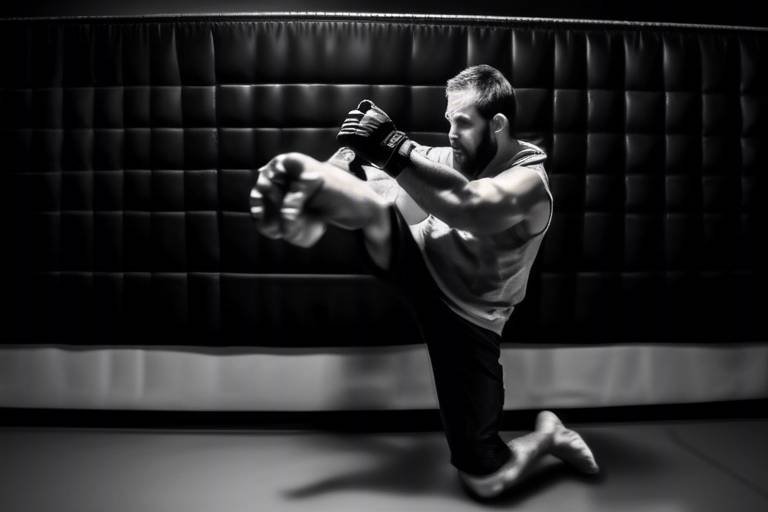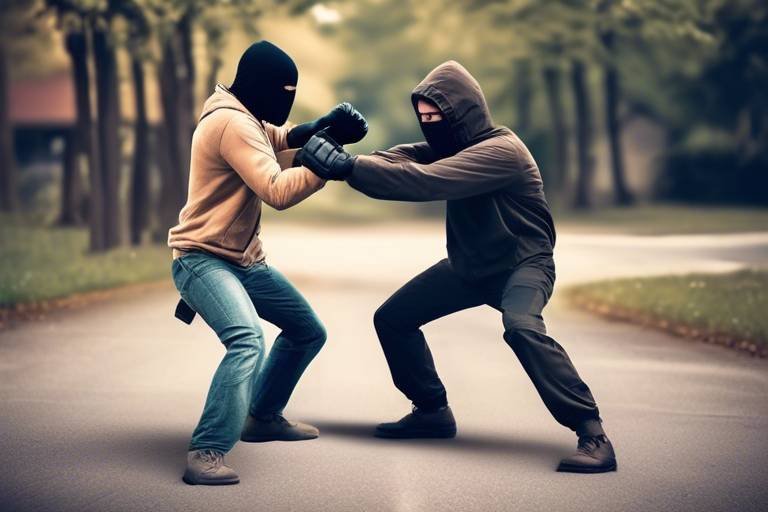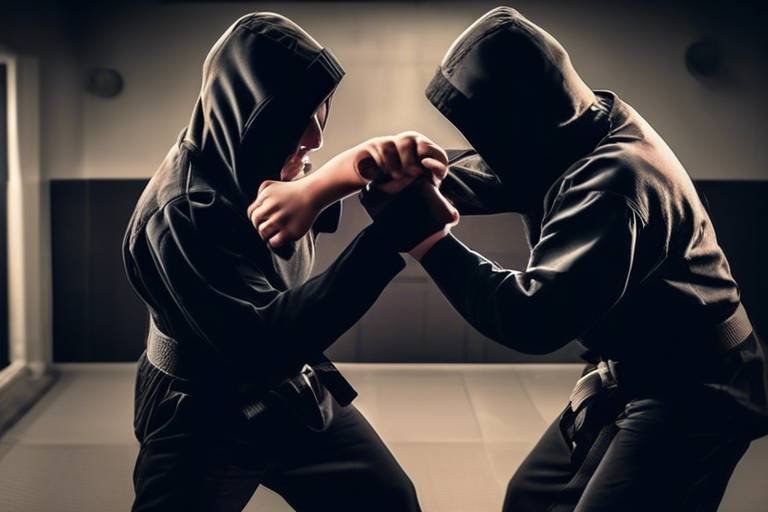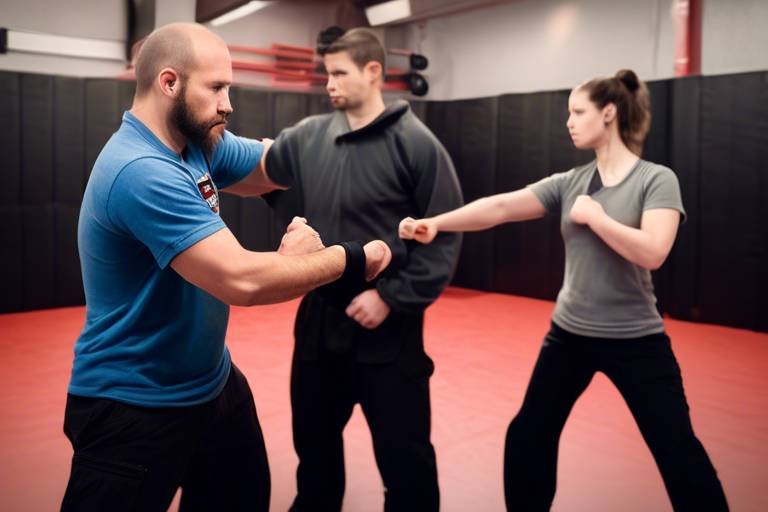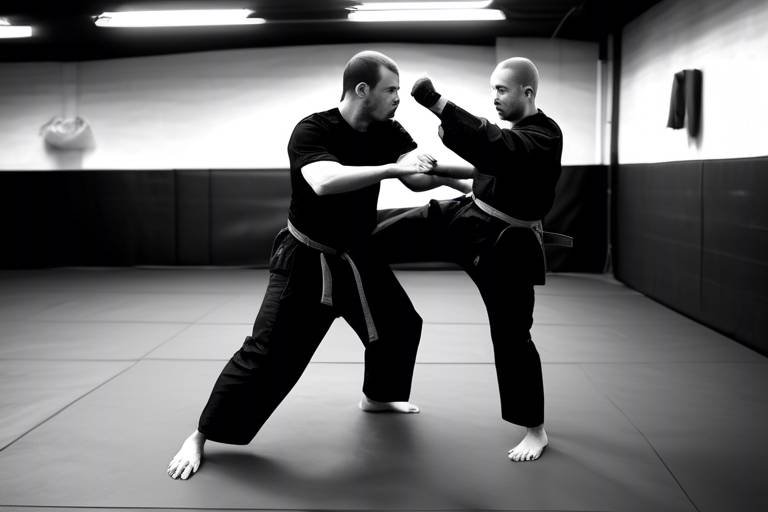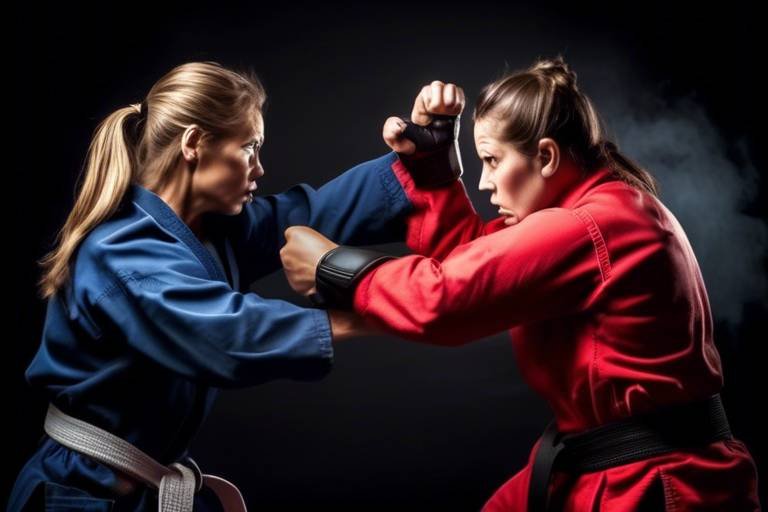How to Embed a Self-Defense Mindset in Your Day to Day Life?
In a world that can sometimes feel unpredictable, cultivating a self-defense mindset is not just a luxury; it’s a necessity. Imagine walking down the street, feeling a sense of empowerment and awareness, ready to tackle whatever comes your way. This article explores practical strategies to cultivate this mindset, helping you enhance your personal safety and awareness in everyday situations. By embedding these strategies into your daily routine, you can transform the way you approach your environment, making safety a natural part of your life.
A self-defense mindset is more than just learning how to throw a punch or escape a hold; it’s about awareness, preparedness, and the ability to respond effectively to potential threats. Think of it as a mental shield, allowing you to navigate through life with confidence. The key components of this mindset include:
- Awareness: Being conscious of your surroundings and the people in them.
- Preparedness: Having a plan and knowing how to react in various situations.
- Response: The ability to take action swiftly and effectively when necessary.
Understanding these elements is crucial because they form the foundation of your self-defense strategy. When you cultivate a self-defense mindset, you’re not just protecting yourself; you’re enhancing your overall quality of life.
Situational awareness is the cornerstone of recognizing potential dangers before they escalate. It’s about tuning in to your environment and understanding what’s happening around you. To enhance your situational awareness, consider these techniques:
Mindfulness practices can significantly improve your focus and awareness. By engaging in activities such as meditation and breathing exercises, you can sharpen your ability to notice changes in your environment. It’s like switching on a high-definition lens that allows you to see the world with greater clarity. When you practice mindfulness, you’re training your brain to be present, which can help you identify potential threats before they become serious.
Incorporating mindfulness into your routine doesn’t have to be complicated. Here are some practical exercises that can easily fit into your day-to-day life:
- Morning Breathing: Spend five minutes each morning focusing on your breath. Inhale deeply, hold for a moment, and exhale slowly.
- Mindful Walking: While walking, pay attention to your surroundings. Notice the colors, sounds, and scents around you.
- Gratitude Journaling: At the end of the day, jot down three things you noticed or appreciated. This practice enhances awareness of your environment.
The benefits of mindfulness extend beyond self-defense. Improved focus and reduced stress can positively impact various aspects of life, including your relationships and work performance. By being more present, you’ll find yourself making better decisions and responding to challenges with greater resilience.
Understanding what constitutes a threat is essential for your safety. Common indicators of danger may include:
- Unusual behavior from individuals around you.
- Changes in the atmosphere, like sudden silence or heightened tension.
- Physical proximity of strangers in unfamiliar settings.
By learning to assess situations effectively, you can reduce the likelihood of being caught off guard.
Physical confidence can deter potential aggressors. When you feel strong and capable, it shows. This section covers fitness routines and self-defense classes that enhance your physical capabilities and self-assurance. Engaging in regular physical activity not only boosts your confidence but also prepares you for unexpected situations.
Learning basic self-defense techniques is empowering. Whether it’s taking a class in Krav Maga, Brazilian Jiu-Jitsu, or even a local self-defense workshop, the skills you acquire can be invaluable. Imagine being able to defend yourself if the need arises; it’s a game changer. Here are some popular self-defense styles to consider:
- Krav Maga: Focuses on real-world situations and practical techniques.
- Brazilian Jiu-Jitsu: Emphasizes ground fighting and submissions.
- Boxing: Teaches striking and footwork, enhancing overall fitness.
Physical fitness plays a vital role in self-defense. Regular exercise enhances your strength, agility, and overall confidence in threatening situations. Think of your body as a well-tuned machine; the better you maintain it, the more efficiently it will perform when you need it most.
Having a reliable support network can significantly enhance your safety. Surrounding yourself with like-minded individuals creates a sense of community and shared responsibility. This section emphasizes the importance of relationships in fostering a self-defense mindset.
A mentor can provide guidance and support in developing your self-defense skills. Seek out experienced individuals in your community who can share their knowledge and expertise. Having someone to turn to for advice can make a world of difference in your journey toward personal safety.
Participating in community safety initiatives can build connections and enhance personal safety. Joining local programs focused on self-defense and awareness not only equips you with skills but also fosters a sense of belonging. Together, you can create a safer environment for everyone.
Q1: Can anyone learn self-defense?
A1: Absolutely! Self-defense techniques can be learned by individuals of all ages and fitness levels. The key is to find a program that suits your needs.
Q2: How often should I practice self-defense techniques?
A2: Regular practice is essential. Aim for at least once a week to maintain your skills and build muscle memory.
Q3: Is mindfulness really effective for self-defense?
A3: Yes! Mindfulness enhances your situational awareness, allowing you to identify potential threats more effectively.
Q4: What if I can’t find a self-defense class nearby?
A4: There are plenty of online resources and videos available that can help you learn basic self-defense techniques at home.

Understanding the Self-Defense Mindset
A self-defense mindset is not just about physical combat; it's a comprehensive approach that encompasses awareness, preparedness, and the ability to respond effectively to potential threats. Imagine walking through a crowded street, your senses heightened, your mind alert to the world around you. This is the essence of a self-defense mindset. It’s about being aware of your environment and understanding that danger can lurk in the most unexpected places. By adopting this mindset, you empower yourself to take control of your safety, transforming from a passive observer into an active participant in your own protection.
At its core, the self-defense mindset can be broken down into several key components:
- Awareness: The ability to recognize your surroundings and identify potential threats before they escalate.
- Preparedness: Having the knowledge and tools at your disposal to respond effectively when a threat arises.
- Response: Knowing how to react in a way that maximizes your safety and minimizes risk.
Understanding these components is crucial because they form the foundation of how you navigate your daily life. For instance, awareness is like having a sixth sense; it allows you to pick up on subtle cues that something might be off. Have you ever felt that prickling sensation on the back of your neck? That’s your intuition kicking in, and it’s essential to listen to it. By honing your awareness, you can spot potential dangers, whether it’s someone following you too closely or a situation that feels uneasy.
Preparedness is equally important. It’s not enough to just be aware; you need to have a plan. Think of it like preparing for a big game. You wouldn’t just show up without practicing first, right? Similarly, you should equip yourself with knowledge about self-defense techniques and strategies. This could involve taking self-defense classes, reading books, or even watching instructional videos. The more prepared you are, the more confident you’ll feel in your ability to handle unexpected situations.
Finally, response is where the rubber meets the road. It’s one thing to be aware and prepared, but when faced with a real threat, how do you react? This is where your training and mindset come into play. You want to respond in a way that prioritizes your safety. Whether it’s escaping the situation, using verbal de-escalation techniques, or employing physical self-defense moves, having a clear response plan can make all the difference.
In summary, cultivating a self-defense mindset is about creating a proactive approach to personal safety. It involves a blend of awareness, preparedness, and a well-thought-out response. By integrating these elements into your daily life, you not only enhance your safety but also boost your confidence, allowing you to navigate the world with a sense of empowerment. So, are you ready to embrace this mindset and take charge of your personal safety?

Developing Situational Awareness
Situational awareness is the cornerstone of a self-defense mindset. It’s about being aware of your surroundings and understanding the potential risks that may be present. Imagine walking through a crowded street, and instead of being lost in your thoughts or glued to your phone, you’re actively observing the people around you and the environment. This heightened state of awareness can be the difference between safety and danger. By developing situational awareness, you empower yourself to recognize and respond to threats before they escalate.
To enhance your situational awareness, consider adopting a few key techniques. First, practice the art of observation. This means not just looking, but truly seeing. Pay attention to the details: the expressions on people’s faces, the sounds in your environment, and any unusual behaviors. You might ask yourself, "What stands out?" or "What feels out of place?" These questions can sharpen your perception and help you identify potential threats.
Another effective method to boost your situational awareness is to engage in regular mindfulness practices. Mindfulness can help you stay grounded in the present moment, allowing you to focus on what’s happening around you. Techniques such as meditation and controlled breathing can significantly enhance your ability to notice subtle changes in your environment. When you’re more in tune with your surroundings, you’re less likely to become a target.
Mindfulness isn’t just about sitting quietly; it’s about cultivating a habit of awareness that you can carry into your daily life. Here are some simple daily mindfulness exercises you can incorporate:
- Morning Mindfulness: Start your day with a few minutes of deep breathing. Focus on your breath and the sensations in your body. This sets a calm tone for the day.
- Walking Meditation: While walking, pay attention to each step. Feel your feet connect with the ground and notice the sights and sounds around you.
- Mindful Eating: When you eat, savor each bite. Notice the flavors and textures, which can help ground you in the moment.
As you practice these exercises, you’ll find that your ability to notice changes in your environment improves significantly. You’ll become more adept at spotting potential threats, such as someone acting suspiciously or an unfamiliar vehicle following you. Remember, situational awareness is like a muscle; the more you use it, the stronger it becomes.
The benefits of mindfulness extend far beyond just improving your self-defense capabilities. Research has shown that regular mindfulness practice can lead to:
- Improved Focus: Mindfulness enhances your ability to concentrate on tasks, which can lead to better performance in various aspects of life.
- Reduced Stress: By learning to manage your thoughts and emotions, you can lower anxiety levels and improve your overall mental health.
- Enhanced Emotional Regulation: Mindfulness helps you respond to situations with greater clarity and calmness, rather than reacting impulsively.
Incorporating mindfulness into your routine not only enhances your situational awareness but also enriches your life in countless ways. So, as you work on being more aware of your surroundings, you’ll also discover that you’re cultivating a deeper connection with yourself and the world around you.
Understanding what constitutes a threat is essential in developing situational awareness. Common indicators of danger can include:
- Unusual behavior from individuals, such as someone loitering or acting nervously.
- Environmental changes, like a sudden silence in a busy area.
- Physical cues, such as someone approaching too closely without a clear purpose.
By being aware of these signs, you can assess situations more effectively and take proactive measures to ensure your safety.

Practicing Mindfulness
In our fast-paced world, where distractions lurk around every corner, can feel like a breath of fresh air. It's about being present, fully engaging with your surroundings, and tuning into your thoughts and feelings without judgment. Imagine standing in a bustling café, the aroma of freshly brewed coffee swirling around you, yet your mind is elsewhere—perhaps worrying about tomorrow's meeting or replaying a past conversation. Mindfulness pulls you back to the moment, helping you appreciate the little things that often go unnoticed.
So, how do you cultivate this powerful skill? It starts with simple mindfulness practices that you can weave into your daily routine. One effective method is meditation, which trains your mind to focus and be aware of the present moment. Just a few minutes of meditation each day can significantly enhance your ability to notice subtle changes in your environment, making you more alert to potential threats. Think of meditation as a mental workout; just as lifting weights builds physical strength, meditation builds mental resilience.
Breathing exercises are another fantastic way to practice mindfulness. By consciously controlling your breath, you can calm your mind and sharpen your focus. For instance, try the following technique:
- Find a quiet space: Sit comfortably with your back straight.
- Inhale deeply: Breathe in through your nose for a count of four.
- Hold your breath: Keep the air in for a count of four.
- Exhale slowly: Release the breath through your mouth for a count of six.
Repeat this cycle for a few minutes, and you'll notice how your mind becomes clearer and your awareness sharper. This simple exercise can be done anywhere—whether you're at home, in the office, or even on your commute. It’s like hitting the reset button on your brain!
Moreover, incorporating mindfulness into your day doesn’t have to be a chore. You can practice it while doing everyday activities like washing the dishes, walking your dog, or even during your morning coffee ritual. Focus on the sensations, the sounds, and the sights around you. This practice not only enhances your awareness but also allows you to fully experience life, making each moment richer and more meaningful.
The benefits of mindfulness extend beyond just self-defense. By enhancing your focus and reducing stress, mindfulness can positively impact various aspects of your life, from your relationships to your work performance. It's like having a secret weapon in your back pocket, ready to boost your mental clarity and emotional well-being.
In conclusion, practicing mindfulness is a transformative journey that empowers you to navigate life with greater awareness and confidence. So, take a moment to pause, breathe, and reconnect with the present—you might just discover a new perspective that enhances both your safety and your overall quality of life.

Daily Mindfulness Exercises
Incorporating mindfulness into your daily routine can be a game changer for enhancing your situational awareness and overall well-being. It doesn’t have to be complicated or time-consuming; even a few minutes a day can make a significant difference. Think of mindfulness as a mental workout. Just as you would train your body to be fit, training your mind to be aware and present is equally important.
One effective way to start is with simple breathing exercises. Find a quiet space, sit comfortably, and focus on your breath. Inhale deeply through your nose for a count of four, hold for four, and exhale through your mouth for a count of six. Repeat this cycle for five to ten minutes. As you breathe, pay attention to how your body feels with each breath. This exercise not only calms your mind but also sharpens your ability to notice subtle changes in your surroundings.
Another practical exercise is the “5-4-3-2-1” technique. This involves engaging your senses to ground yourself in the present moment. Here’s how it works:
- 5 things you can see: Look around and identify five objects. It could be anything from a picture on the wall to the color of a chair.
- 4 things you can touch: Notice the texture of your clothing, the surface of the chair you’re sitting on, or even the temperature of the air.
- 3 things you can hear: Focus on the sounds around you. It could be the hum of a refrigerator, distant traffic, or birds chirping outside.
- 2 things you can smell: This might be tricky if you’re not in a fragrant environment, but try to identify two scents. If you can’t smell anything, think of your two favorite scents.
- 1 thing you can taste: Focus on the taste in your mouth. It could be the remnants of your last meal or simply the taste of your breath.
These exercises can be seamlessly integrated into your day. You can practice them during your commute, while waiting in line, or even during a break at work. The key is consistency. The more you practice, the more natural it becomes to stay aware and present, enhancing your self-defense mindset.
Additionally, consider keeping a mindfulness journal. Spend a few minutes each evening reflecting on your day. Write down moments when you felt particularly aware or instances where your heightened awareness helped you avoid a potential threat. This reflective practice not only reinforces your mindfulness skills but also helps you track your progress over time.
In summary, daily mindfulness exercises can significantly enhance your self-defense mindset. By dedicating just a few moments each day to these practices, you’ll find yourself more attuned to your surroundings, better equipped to recognize potential threats, and ultimately, more confident in your ability to respond effectively. Remember, mindfulness is a journey, not a destination, so be patient with yourself as you cultivate this essential skill.

Benefits of Mindfulness
When we talk about mindfulness, we're diving into a treasure trove of benefits that go beyond just enhancing your self-defense capabilities. Think of mindfulness as a superpower that sharpens your senses and grounds you in the present moment. By practicing mindfulness, you not only become more aware of your surroundings, but you also cultivate a sense of peace and clarity that can transform your daily life.
One of the most significant benefits of mindfulness is its ability to reduce stress. In our fast-paced world, stress can feel like an unwelcome companion, but mindfulness teaches us to acknowledge our feelings without judgment. By focusing on the present, you can let go of worries about the past or future, which often contribute to anxiety. Imagine standing in a crowded subway, feeling the rush of people around you. With mindfulness, you can center yourself, breathe deeply, and find calm amidst the chaos.
Moreover, mindfulness enhances your focus and concentration. This is particularly useful not just in self-defense situations but in everyday tasks like work or studying. When you're fully present, your brain can filter out distractions, allowing you to tackle challenges with a clear mind. For example, when you're engaged in a conversation, mindfulness helps you listen actively, making the other person feel valued while also improving your communication skills.
Additionally, mindfulness fosters emotional resilience. Life throws curveballs at us—be it personal challenges, work stress, or unexpected events. By practicing mindfulness, you develop a toolkit to handle these situations more effectively. Instead of reacting impulsively, you learn to pause, assess, and respond thoughtfully. This shift can lead to healthier relationships and improved decision-making, which are vital in both personal and professional spheres.
To put it simply, the benefits of mindfulness can be encapsulated as follows:
- Stress Reduction: Helps manage anxiety and promotes a sense of calm.
- Improved Focus: Enhances concentration, making tasks easier to tackle.
- Emotional Resilience: Equips you to deal with challenges thoughtfully.
- Better Relationships: Fosters active listening and empathy.
Incorporating mindfulness into your routine doesn’t require hours of meditation each day. Even a few minutes spent focusing on your breath or observing your surroundings can yield significant benefits. As you become more mindful, you'll notice a shift not only in your self-defense mindset but in how you approach life itself. It's like putting on a pair of glasses that help you see the world more clearly, allowing you to navigate through it with confidence and grace.

Recognizing Potential Threats
Recognizing potential threats is an essential skill for anyone looking to enhance their personal safety. It's not just about being aware of your surroundings; it's about understanding the subtle cues that can indicate danger. Think of it as tuning into a radio station—if you're not tuned in, you might miss the important signals. So, what should you be looking for?
First and foremost, body language can be a significant indicator of someone's intentions. Are they standing too close? Do they seem overly agitated or aggressive? These signs can often reveal a lot more than words. For instance, if someone is pacing back and forth or constantly checking their surroundings, it might be a sign that they are feeling anxious or threatened themselves, which could escalate into aggressive behavior if they feel cornered.
Another crucial aspect to consider is the environment. Are you in a crowded area where help is readily available, or are you isolated in a dimly lit alley? Your surroundings can greatly influence the level of threat you may face. If you're in a place that feels off—maybe it's too quiet, or you notice an unusual number of people loitering—trust your instincts. Your gut feeling is often your best defense.
Moreover, being aware of unusual behavior can also help you recognize potential threats. If someone is acting out of the ordinary—such as someone who seems overly interested in you or your belongings—it's essential to take notice. Here are some behaviors that could indicate a potential threat:
- Constantly glancing in your direction
- Following you without a clear purpose
- Exhibiting signs of aggression or hostility
It's also wise to familiarize yourself with common scenarios that can escalate into dangerous situations. For example, late-night public transportation can be a hotspot for crime, and being aware of who is around you during these times can be crucial. Always remember that if something feels off, it probably is. Trusting your instincts can often be the first line of defense.
Lastly, it’s important to remember that recognizing potential threats is not about living in fear; it’s about being prepared. By developing a keen sense of awareness and understanding the signs of potential danger, you empower yourself to take action—whether that means removing yourself from a situation, seeking help, or preparing to defend yourself if necessary. Knowledge is power, and in the realm of self-defense, it can make all the difference.
Q: How can I improve my situational awareness?
A: You can enhance your situational awareness by practicing mindfulness, regularly assessing your surroundings, and being conscious of changes in your environment.
Q: What are some common indicators of a potential threat?
A: Common indicators include aggressive body language, unusual behavior, and environmental cues such as isolation or darkness.
Q: Is it necessary to take a self-defense class to recognize threats?
A: While self-defense classes can be beneficial, recognizing threats primarily relies on awareness and understanding your surroundings.

Building Physical Confidence
Building physical confidence is more than just hitting the gym or attending a self-defense class; it's about fostering a sense of empowerment that radiates from within. When you feel strong and capable, you not only deter potential aggressors but also enhance your overall well-being. Think of it like this: just as a lion walks with confidence through the savannah, knowing it is powerful and in control, you too can cultivate that same aura of strength in your everyday life. Confidence transforms how others perceive you and how you perceive yourself, making it a crucial component of a self-defense mindset.
To truly build this confidence, consider integrating a variety of fitness routines and self-defense classes into your life. Not only do these activities improve your physical capabilities, but they also provide a sense of accomplishment and resilience. For instance, participating in martial arts or boxing can teach you effective techniques while simultaneously boosting your strength and agility. Imagine yourself mastering a roundhouse kick or learning to throw a perfect jab—each small victory contributes to a larger sense of confidence.
Here are some popular self-defense techniques and fitness routines that can help you build physical confidence:
- Martial Arts: Styles like Krav Maga, Brazilian Jiu-Jitsu, and Muay Thai focus on practical self-defense techniques, enhancing both skill and physical fitness.
- Boxing: This is not just about throwing punches; it improves your footwork, agility, and endurance, making you more adept in any situation.
- Yoga: Surprisingly, yoga can enhance your strength and flexibility while also promoting mental clarity, which is essential in high-stress situations.
When you engage in these activities, you’ll notice that your body becomes stronger and more capable of handling physical challenges. But remember, building physical confidence isn’t just about the workouts; it’s about the mindset you develop along the way. Each drop of sweat is a testament to your commitment to yourself, a reminder that you are capable of more than you might have thought.
Moreover, regular physical activity releases endorphins, the body's natural mood lifters. This not only boosts your physical confidence but also enhances your mental resilience. You might find that after a rigorous workout, you feel more alert and ready to tackle the challenges of the day. It's like sharpening a knife; the more you practice, the sharper you become.
To further bolster your confidence, consider joining a local self-defense class where you can learn alongside others. This not only provides you with valuable skills but also creates a sense of community. The camaraderie you build with your classmates can be a powerful motivator, encouraging you to push your limits and celebrate your progress together.
In conclusion, building physical confidence is a multifaceted journey that encompasses fitness, self-defense training, and a supportive community. Embrace the process, and remember that every small step you take contributes to a larger goal of personal safety and empowerment. With time, you'll not only feel more confident in your physical abilities but also develop a resilient mindset that enhances your overall quality of life.
Q1: How often should I practice self-defense techniques to build confidence?
A1: Consistency is key! Aim for at least two to three sessions a week, whether it's in a class or practicing on your own. Regular practice helps solidify your skills and boosts your confidence.
Q2: Can self-defense training help reduce anxiety in everyday situations?
A2: Absolutely! Self-defense training not only equips you with practical skills but also instills a sense of security and awareness, which can significantly reduce anxiety in potentially threatening situations.
Q3: What if I don't have access to a self-defense class?
A3: No problem! There are plenty of online resources, tutorials, and videos available. You can also practice basic techniques at home or join community groups that focus on personal safety.

Self-Defense Techniques
When it comes to self-defense, knowledge is power. The right can make all the difference in a threatening situation. Think of your body as a well-oiled machine; every part has a role to play, and understanding how to utilize it effectively can enhance your safety. Self-defense isn’t just about physical strength; it’s about strategic thinking and quick responses. Whether you’re facing an aggressive individual or simply want to feel more secure in your daily life, mastering a few key techniques can empower you.
There are various styles of self-defense, each with its own unique focus and methodologies. For instance, Karate emphasizes striking techniques, while Brazilian Jiu-Jitsu focuses on grappling and ground fighting. Understanding these styles can help you choose the right class or instructor for your needs. Many community centers and gyms offer self-defense classes, making it accessible for anyone interested in learning.
Here are some common self-defense techniques that you might encounter in classes:
- Blocking: This involves using your arms or body to deflect an attack, minimizing the impact.
- Striking: Techniques such as punches, kicks, and elbows can be effective in creating distance from an aggressor.
- Escaping holds: Learning how to break free from grabs or holds is crucial, especially in close-range situations.
- Ground defense: Understanding how to protect yourself if you end up on the ground can be life-saving.
One of the most significant benefits of learning self-defense techniques is the boost in confidence that comes with it. Imagine walking down the street, feeling empowered and aware, knowing that you have the skills to handle unexpected situations. It’s not just about physical capability; it’s about the mental fortitude that comes with training. You start to notice your surroundings more, and your body language exudes confidence, which can deter potential threats.
Moreover, self-defense classes often foster a sense of community. You’re not just learning techniques; you’re building relationships with fellow students who share similar goals. This camaraderie can enhance your learning experience and provide ongoing support as you develop your skills. In many ways, it’s like joining a team where everyone has each other’s backs.
Additionally, many self-defense classes incorporate fitness training, which is an added bonus. As you learn to defend yourself, you’re also improving your strength, endurance, and flexibility. This dual benefit means that not only are you preparing for potential threats, but you’re also investing in your overall health. It’s a win-win!
In summary, learning self-defense techniques is a valuable investment in your personal safety and well-being. With the right training, you can cultivate a sense of empowerment that extends beyond physical encounters. So, why not take that first step? Find a local class, connect with a mentor, and immerse yourself in the world of self-defense. You never know when those skills might come in handy!
Q: Do I need to be fit to start self-defense training?
A: No, self-defense classes are designed for all fitness levels. They often include modifications to accommodate beginners.
Q: How long does it take to learn effective self-defense techniques?
A: The time varies based on the individual and the complexity of the techniques. However, even a few classes can equip you with essential skills.
Q: Are self-defense classes safe?
A: Yes, reputable self-defense classes prioritize safety and provide a supportive environment for learning.
Q: Can self-defense training help me in other areas of my life?
A: Absolutely! The confidence and awareness gained through self-defense training can positively impact various aspects of your life, including personal relationships and professional settings.

Fitness and Self-Defense
When it comes to self-defense, physical fitness is not just an added bonus; it's a crucial component that can make all the difference in a threatening situation. Imagine yourself facing an aggressor—your ability to respond effectively can hinge on your strength, speed, and endurance. Just like a well-oiled machine, your body needs to be in top shape to function optimally when it matters most. By prioritizing fitness, you’re not only preparing your body but also your mind, creating a powerful synergy that enhances your confidence and readiness.
Regular exercise is like a shield that fortifies your defenses. It doesn’t just build muscle; it builds resilience. Think of it as training for a marathon rather than a sprint. You want to cultivate stamina, agility, and flexibility, all of which are essential in self-defense scenarios. Whether it's dodging an attack or escaping a dangerous situation, being fit can give you the edge you need. Here are some key benefits of integrating fitness into your self-defense strategy:
- Improved Strength: Strength training increases your ability to physically confront an aggressor.
- Enhanced Agility: Exercises that promote agility help you react quickly to sudden threats.
- Increased Endurance: Cardiovascular fitness allows you to sustain effort when you need to escape or fight back.
Moreover, engaging in fitness activities that focus on self-defense techniques can be incredibly empowering. Many martial arts classes, such as Brazilian Jiu-Jitsu or Kickboxing, not only teach you how to defend yourself but also condition your body in the process. These classes often incorporate rigorous workouts that improve your overall fitness while simultaneously teaching you how to handle potential threats. It's a win-win situation!
In addition to traditional workouts, incorporating functional training can be beneficial. This type of training mimics everyday movements, preparing your body for real-life situations. For instance, practicing movements that involve squatting, lunging, and twisting can enhance your ability to respond to an attack. It’s like rehearsing for a play—when the curtain goes up, you’re ready to perform!
So, how do you get started? First, assess your current fitness level and set realistic goals. Whether it's joining a gym, attending self-defense classes, or simply committing to a daily routine of walking or jogging, the important thing is to stay consistent. Remember, every bit of effort counts. As you progress, you'll likely notice not only improvements in your physical capabilities but also a boost in your self-esteem and confidence.
In conclusion, fitness and self-defense are intertwined in a way that can significantly enhance your ability to protect yourself. By committing to a regular fitness routine, you’re not just building a stronger body; you’re cultivating a mindset that is ready to face challenges head-on. So lace up those sneakers, hit the gym, and embrace the journey of becoming a fitter, more confident version of yourself!
Q: How often should I exercise to improve my self-defense skills?
A: Aim for at least 3-4 times a week, incorporating both strength training and cardio workouts to build overall fitness.
Q: Can I practice self-defense techniques at home?
A: Absolutely! There are many online resources and videos that can guide you through self-defense moves you can practice in your living room.
Q: What type of fitness classes should I look for?
A: Look for classes that focus on martial arts, kickboxing, or functional training, as they combine fitness with self-defense techniques.
Q: Is it necessary to be fit to learn self-defense?
A: Not at all! Self-defense training can help improve your fitness over time, and you can start at any fitness level.

Cultivating a Support Network
In today's world, having a reliable support network is not just a luxury—it's a necessity. When it comes to enhancing your personal safety and cultivating a self-defense mindset, the people around you can make all the difference. Think of your support network as a safety net; it’s there to catch you when things get tough, providing not only emotional support but also practical help in times of need. So, how do you go about building this essential network?
First and foremost, it's crucial to surround yourself with individuals who share your values and understand the importance of personal safety. This could be friends, family, colleagues, or even neighbors. Start by reaching out to those who already have an interest in self-defense or personal safety. You might be surprised at how many people are eager to join you in this journey. Consider organizing a small group where you can share tips, practice techniques, and discuss experiences. Not only does this foster a sense of community, but it also reinforces your commitment to staying safe.
Another effective way to cultivate your support network is by finding a mentor. A mentor can provide invaluable guidance and insight as you navigate the complexities of self-defense. Look for someone who has experience in self-defense training or personal safety. This could be an instructor at a local dojo, a police officer, or even a community leader passionate about safety initiatives. Having someone to turn to for advice can help you develop your skills and boost your confidence in real-world situations.
Moreover, engaging in community safety programs can significantly enhance your network. These programs often bring together individuals with a shared goal of improving personal safety in their neighborhoods. By participating in these initiatives, you not only learn valuable skills but also meet like-minded people who can become part of your support network. Whether it’s a self-defense workshop, a neighborhood watch meeting, or a community safety fair, getting involved can open doors to new friendships and alliances.
To further illustrate the importance of a support network, consider the following table that outlines the benefits of having a solid support system:
| Benefit | Description |
|---|---|
| Emotional Support | Having people to talk to can alleviate stress and anxiety related to personal safety concerns. |
| Practical Assistance | Your network can provide help in emergency situations, whether it's calling for help or providing a safe ride home. |
| Skill Development | Practicing self-defense techniques with friends can enhance your skills and boost confidence. |
| Increased Awareness | Sharing experiences and tips can heighten everyone's awareness of potential threats. |
In conclusion, cultivating a support network is a vital aspect of fostering a self-defense mindset. It’s about building relationships that empower you to be more aware, prepared, and confident in your ability to handle potential threats. So, take the time to reach out, connect, and engage with those around you. Remember, safety is a community effort!
- What is a self-defense mindset? A self-defense mindset involves being aware of your surroundings, prepared for potential threats, and capable of responding effectively to danger.
- How can I find a mentor for self-defense? Look for local self-defense classes, community programs, or reach out to individuals in your network who have experience in this area.
- Why is situational awareness important? Situational awareness helps you recognize potential dangers before they escalate, allowing you to react appropriately and stay safe.
- Can mindfulness practices help with self-defense? Yes! Mindfulness can improve your focus and awareness, making it easier to notice changes in your environment.

Finding a Mentor
Finding a mentor in the realm of self-defense is akin to discovering a compass in a dense forest; it provides direction, guidance, and invaluable insights that can significantly enhance your journey towards personal safety and empowerment. A mentor can be a seasoned self-defense instructor, a community leader, or even a friend who has experience in self-defense techniques. The right mentor will not only teach you the physical skills needed but also instill confidence and a deeper understanding of the self-defense mindset.
When seeking a mentor, consider the following steps to ensure you find someone who aligns with your personal goals and values:
- Identify Your Goals: Before you start your search, take a moment to reflect on what you want to achieve. Are you looking to learn specific self-defense techniques, or are you more interested in building overall confidence and awareness? Understanding your objectives will help you find a mentor who specializes in those areas.
- Research Local Resources: Check out local self-defense classes, martial arts studios, or community centers that offer programs related to personal safety. Many times, instructors in these settings are open to mentoring individuals who show genuine interest and commitment.
- Ask for Recommendations: Don’t hesitate to reach out to friends, family, or colleagues who have experience in self-defense. Personal recommendations can lead you to mentors who have a proven track record of helping others.
- Attend Workshops and Seminars: Participating in self-defense workshops or seminars is a great way to meet potential mentors. These events often attract experienced practitioners who are passionate about sharing their knowledge.
Once you’ve identified potential mentors, it’s essential to approach them with respect and an open mind. Express your interest in learning from them and ask if they would be willing to guide you on your self-defense journey. Remember, mentorship is a two-way street; be prepared to show your commitment and willingness to learn.
Additionally, consider the importance of establishing a rapport with your mentor. A good mentor-mentee relationship is built on trust, communication, and mutual respect. Engage in open discussions about your experiences, challenges, and progress. This connection will not only enhance your learning experience but also create a support system that can be invaluable in your self-defense journey.
In conclusion, finding a mentor is a pivotal step in cultivating a self-defense mindset. With the right guidance, you can empower yourself to navigate everyday situations with greater confidence and awareness. So, take the plunge, seek out that mentor, and embark on a transformative journey towards personal safety!
Q1: How do I know if a mentor is right for me?
A1: Look for someone whose approach aligns with your goals and values. Trust your instincts and ensure you feel comfortable communicating with them.
Q2: Can I have more than one mentor?
A2: Absolutely! Having multiple mentors can provide you with diverse perspectives and skill sets, enriching your learning experience.
Q3: What should I do if I feel my mentor isn’t helping me?
A3: Openly communicate your concerns with your mentor. If the situation doesn’t improve, it might be time to seek guidance from someone else.

Engaging in Community Safety Programs
Engaging in community safety programs is not just about learning self-defense; it's about creating a network of support and awareness that can significantly enhance your personal safety. Think of it as building a safety net made of people who look out for one another. These programs often bring together individuals from various backgrounds, fostering a sense of community that can be both empowering and reassuring. Imagine walking down your street and knowing that your neighbors are trained and aware, ready to help if something goes wrong.
Participating in these initiatives allows you to meet like-minded individuals who share your commitment to safety. You’ll find that many community safety programs offer a variety of activities, such as workshops, seminars, and hands-on training sessions. These gatherings not only equip you with essential skills but also provide a platform for discussing safety concerns in your neighborhood. Plus, who doesn’t enjoy a little camaraderie while learning how to protect themselves?
One of the most significant benefits of joining community safety programs is the opportunity to learn from experienced instructors. Many programs are led by local law enforcement or trained self-defense professionals who can provide valuable insights into real-world scenarios. They can help you understand not just the techniques, but also the mindset needed to handle potential threats effectively. For instance, you might learn how to de-escalate a situation verbally, which can often be more effective than physical confrontation.
Moreover, these programs often encourage participants to engage in discussions about local crime trends, safety tips, and personal experiences. This exchange of knowledge can be enlightening and can help you develop a keen sense of situational awareness. You’ll start to notice things you might have overlooked before, like unusual behavior or changes in your environment. It’s like having a safety radar that becomes more sensitive the more you practice.
Additionally, community safety programs can lead to the formation of local safety groups or watch programs. These groups can serve as an alert system for suspicious activities in your area, helping everyone stay informed and vigilant. When you’re part of a group that actively communicates and shares information, you’re not just a passive participant; you’re an active contributor to your community’s safety.
In conclusion, engaging in community safety programs is a proactive step toward enhancing your personal safety and that of your community. It’s about building relationships, sharing knowledge, and creating an environment where everyone feels empowered to protect themselves and others. So why not check out what your community has to offer? You might just find a new passion for safety and self-defense that you never knew you had!
- What types of community safety programs are available? Community safety programs can include self-defense classes, neighborhood watch initiatives, safety seminars, and workshops on crime prevention strategies.
- How can I find a community safety program near me? You can search online for local community centers, police departments, or non-profit organizations that offer safety programs. Social media platforms and community bulletin boards can also provide information.
- Are community safety programs free? Many programs are offered at little to no cost, but some may require a small fee for materials or instruction. It's best to check with the specific program for details.
- Can I participate in community safety programs if I have no prior experience? Absolutely! Most programs are designed for individuals of all skill levels, and they often start with the basics to ensure everyone feels comfortable.
Frequently Asked Questions
- What is a self-defense mindset?
A self-defense mindset is all about being aware, prepared, and ready to respond to potential threats in your everyday life. It’s like having an internal alarm system that helps you recognize danger before it escalates. By cultivating this mindset, you empower yourself to enhance your personal safety and stay alert in various situations.
- How can I improve my situational awareness?
Improving situational awareness is like training your brain to be more observant. You can start by practicing mindfulness, which helps sharpen your focus and awareness. Daily exercises, such as paying attention to your surroundings while walking or doing breathing exercises, can significantly enhance your ability to notice changes and potential threats around you.
- Are there specific mindfulness exercises I can do daily?
Absolutely! Simple mindfulness exercises can easily fit into your routine. Try dedicating a few minutes each day to deep breathing or meditation. You can also practice being present by focusing on your senses—what you see, hear, and feel. These practices can help you stay grounded and aware of your environment.
- What are some common indicators of potential threats?
Recognizing potential threats involves being aware of your surroundings and identifying unusual behaviors. Look for signs like someone acting aggressively, loitering in a suspicious manner, or making you feel uncomfortable. Trust your instincts—if something feels off, it probably is, and it's essential to assess the situation carefully.
- How can physical confidence deter aggressors?
Physical confidence can be a powerful deterrent against potential aggressors. When you feel strong and capable, you project an aura of self-assurance. Engaging in fitness routines and self-defense classes not only boosts your physical abilities but also enhances your overall confidence, making you less likely to be targeted.
- What self-defense techniques should I learn?
Learning basic self-defense techniques is vital for feeling secure. Consider exploring various styles such as Krav Maga, Brazilian Jiu-Jitsu, or kickboxing. Many local classes offer beginner-friendly sessions that can equip you with essential skills to defend yourself if the need arises.
- How does physical fitness relate to self-defense?
Physical fitness plays a significant role in self-defense. Regular exercise improves your strength, agility, and endurance, all of which are crucial in threatening situations. Plus, being fit boosts your confidence, making you feel more capable of handling any challenges that may come your way.
- Why is having a support network important for self-defense?
A reliable support network enhances your safety by providing guidance, resources, and encouragement. Surrounding yourself with people who share your self-defense goals can motivate you to stay committed and informed. Community connections can also lead to opportunities for learning and participating in safety programs together.
- How can I find a mentor in self-defense?
Finding a mentor can be incredibly beneficial in developing your self-defense skills. Look for experienced individuals in your community, perhaps through local martial arts studios or self-defense workshops. Don’t hesitate to reach out and express your interest in learning; many seasoned practitioners are eager to share their knowledge.
- What are the benefits of engaging in community safety programs?
Participating in community safety programs helps build connections with others while enhancing your personal safety. These initiatives often provide valuable training and resources, allowing you to learn from experts and practice self-defense techniques in a supportive environment. Plus, it fosters a sense of community that can be incredibly empowering.

